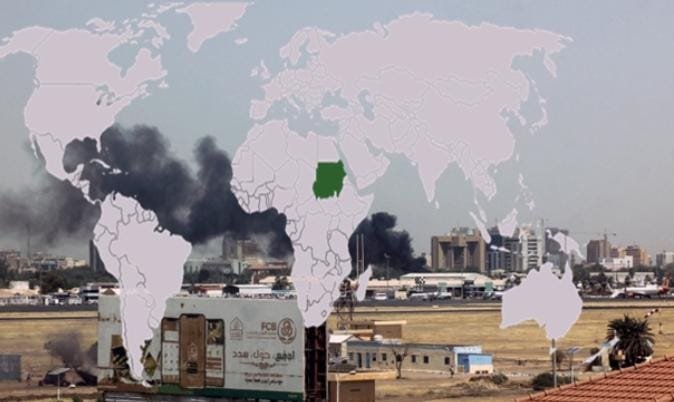Fighting erupted in Khartoum, the capital of the Republic of Sudan on Saturday between the Sudanese military and the Rapid Support Forces (RSF). Both organizations has accused each other of attacking their respective bases in the capital Khartoum.
Also read; Educated Chinese and Veterans to top draft list in times of war
Army spokesman Brigadier General Nabil Abdallah claimed to the media outlet that the paramilitary group had triggered the fighting by attacking “several army camps in Khartoum and elsewhere around Sudan.” The official asserted that the “army is carrying out its duty to safeguard the country.”
The RSF insists that its forces came under attack first, with a “large force from the army entering camps in Soba in Khartoum and laying siege to paramilitaries there.” The unit accused the military of launching a “sweeping attack with all kinds of heavy and light weapons.”
The confrontation between the army and the powerful paramilitary group has been boiling under the surface for months. An eventual showdown between the two appeared inevitable, with diplomats in Khartoum warning in early 2022 that they feared such an outbreak of violence.
On Thursday, the Sudanese army leadership accused the RSF of deploying forces to Khartoum without its consent, denouncing the move as a “violation of the law.”
The Sudanese armed forces are broadly loyal to Gen Abdel Fattah al-Burhan, the country’s de facto ruler, while the paramilitaries of the Rapid Support Forces (RSF), a collection of militia, follow the former warlord Gen Mohamed Hamdan Dagalo, known as Hemedti.
The former ruler of Sudan, Omar Hassan Ahmad al-Bashir founded the RSF to crush a rebellion in Darfur that began more than 20 years ago due to the political and economic marginalization of the local people by Sudan’s central government.
The RSF also know by the name Janjaweed was associated with widespread atrocities. Al-Bashir in 2013 transformed the Janjaweed into a semi-organized paramilitary force and gave their leaders military ranks before deploying them to crush a rebellion in South Darfur and subsequently sent many of them to fight in the war in Yemen, and later Libya.
Both the regular army and the RSF cooperated to oust Bashir in 2019. Leaders of these forces were involved in the power-sharing deal with the civilians who led the protests against Bashir, which was supposed to bring about a transition towards a democratic government, was interrupted by a coup in October 2021.
The country is currently led by the Transitional Sovereign Council. Its president – and de facto ruler of the nation – is army Chief General Abdel Fattah Al-Burhan. RSF commander General Mohamed Hamdan Dagalo, also known as Hemedti, is the deputy chairman.
Tensions between the military and RSF have escalated since then as the two groups have competed for legitimacy and control of the country.
In recent months, these tensions were exacerbated by a deterioration in relations between General Abdel Fattah al-Burhan, commander of Sudan’s military, and General Mohamed Hamdan Dagalo, head of the RSF.
The row over how the RSF should be integrated into the military, as well as which authority should oversee the process, has placed the country’s democratic transition in limbo.
Sudan is a strategically located, bordering the Red Sea, the Sahel region and the Horn of Africa. Its strategic location and agricultural wealth have attracted regional power plays.
Russia, the US, Saudi Arabia, United Arab Emirates and other powers are all battling for influence in Sudan.
While the Middle-East power see Sudan as an opportunity to push back against Islamist influence in the region, Western powers fear the potential for a Russian base on the Red Sea, which Sudanese military leaders have expressed openness to.
At least 56 civilians have been killed and 595 people, including combatants, have been wounded in fierce fighting between the Sudanese army and the paramilitary Rapid Support Forces (RSF), the Sudanese Doctors Union says as the violence entered its second day in the capital, Khartoum.
Nnamdi Maduakor is a Writer, Investor and Entrepreneur
